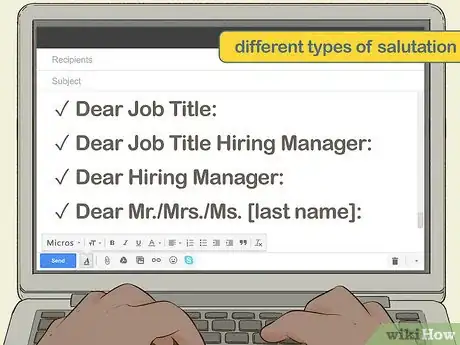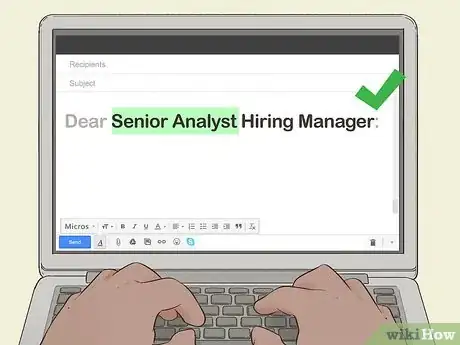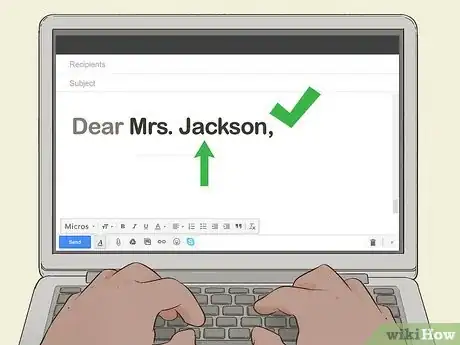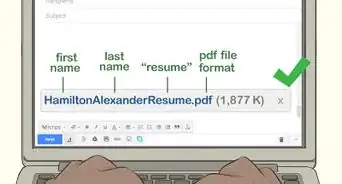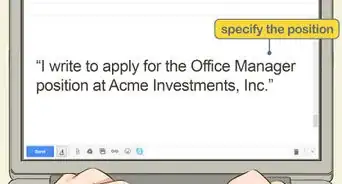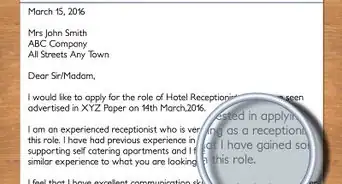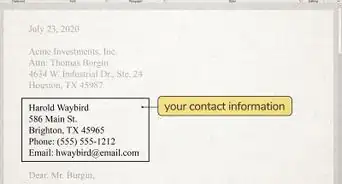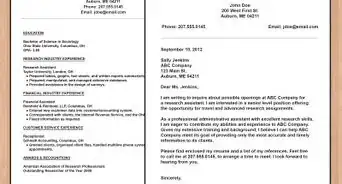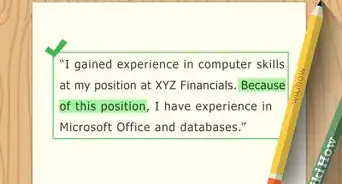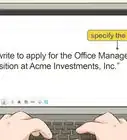This article was co-authored by Amber Rosenberg, PCC and by wikiHow staff writer, Jennifer Mueller, JD. Amber Rosenberg is a Professional Life Coach, Career Coach, and Executive Coach based in the San Francisco Bay Area. As the owner of Pacific Life Coach, she has 20+ years of coaching experience and a background in corporations, tech companies, and nonprofits. Amber trained with the Coaches Training Institute and is a member of the International Coaching Federation (ICF).
This article has been viewed 25,613 times.
If you're writing a cover letter to submit with your résumé to apply for a job, ideally, it should be addressed to a specific recipient. Knowing the hiring manager's name sends the message that you've done your homework and are serious about the job. However, sometimes you simply can't find the name of the appropriate person despite your best efforts. In that situation, it's okay to address the recipient by their job title. You might also consider addressing your letter to the head of the department where you're applying to work.[1]
Steps
Finding the Right Name
-
1Check the job post for a specific name. If you're applying for a job you saw listed on a job board or other website, read carefully over the post again. Most job listings include the name of the person in charge of hiring for that position.[2] The post may also give additional information on how to address your cover letter.[3]
- If the job listing instructs you to address your cover letter to a job title or other designation, follow those instructions exactly. The company may be using a filter to collect applications, particularly if you're submitting your cover letter and résumé by email.
-
2Look for the hiring manager on the company's website. If there's no specific information on the job listing, go to the company's website and look for a list of employees. You may be able to find someone in charge of hiring that way.[4]
- Some small, privately held companies or startups may not have a list of employees on their website. Extremely small "mom and pop" companies may not even have a website at all. In that case, do a general internet search for the name of the company and see what comes up.
- You can also search the company on career networking sites, such as LinkedIn. You may be able to find the name of someone in charge of hiring new employees.[5]
Tip: If the job is posted on LinkedIn, use the name of the person who posted the listing. Even if they aren't the hiring manager, they are likely involved in the hiring process and can get your cover letter and résumé to the right person.
Advertisement -
3Call the company and ask who's in charge of hiring new employees. If none of your research yields a name, there's nothing wrong with calling or emailing the company before you draft your cover letter. Simply explain that you're preparing to apply for a job and want to know who your cover letter should be addressed to.[6]
- If you're applying to a larger corporation, you may want to provide the job title you're interested in or the department where you're applying to work. Larger corporations likely have more than one hiring manager, depending on the job.
- For the largest companies, you'll have better luck asking to be connected to human resources. Someone in that department would be more likely to know the name you'll need than a receptionist or operator.
Using a Job Title
-
1Look for the name or job title of an executive or department head. You can't go wrong with addressing your letter to an executive or department head, even if they aren't directly responsible for hiring. Executives may seldom get résumés and cover letters, especially in larger corporations, so this can help you stand out.[7]
- For example, if you're applying for an accounting position, you might address your cover letter to the "Chief Financial Officer."
Tip: Use an internet search to come up with a list of executives for the company. If all else fails, you could address your cover letter to the president or chief executive officer of the company.
-
2Tailor your greeting to the job you're applying for. The job title you use should typically include the name of the job you're applying for, or at least the name of the department. This ensures that your letter will get to the right person if you can't find a specific recipient name.[8]
- For example, if you're applying for a job as a senior analyst, you might address your cover letter to the "Senior Analyst Hiring Manager."
-
3Use "hiring manager" or "hiring team" as a last resort. Smaller companies and startups may not have a lot of specific job titles or departments. It's likely that the company only consists of a few managers who are all responsible for fulfilling several different roles. In that situation, a more general job title may work.[9]
- In a smaller company or startup, you don't have to worry as much about your cover letter and résumé getting to the right person. It's likely that everyone who works for the company knows that they're hiring, and knows who's in charge of reviewing applicants.
Formatting Your Letter
-
1Start off formally by including "Dear." When writing a cover letter, you should always err on the side of formality. While it's common to see business letters that omit the "dear" and just list the name followed by a colon, with cover letters you should start your salutation with "Dear."[10]
- Sometimes "hello" is appropriate, particularly if you're sending your cover letter using email. However, unless you know the company is more casual, including the "dear" won't hurt – even in email correspondence.
-
2List the name of the recipient. Unless you're certain that the company is more casual and prefers to be on a first-name basis, use the last name of the recipient with the title "Mr." or "Ms." Avoid using "Mrs." unless you are certain that the recipient is married and uses that title professionally.[11]
- For example, if the recipient has her name listed on the company's website as "Mrs. Shirley Jackson," it's okay to address her as "Mrs. Jackson" in your cover letter.
- If you're not sure about the recipient's gender identity, use their first and last name instead of "Mr." or "Ms."
Tip: Make sure you don't confuse the recipient's first name and family name. If you're not familiar with the order, err on the side of caution and use both.
-
3Include an academic or professional title if appropriate. If the recipient has a military rank or other title, use that before their name instead of "Mr." or "Ms." Abbreviate the title as appropriate. Since academic and professional titles, as well as military ranks, are gender neutral, you would typically include only the recipient's last or family name.[12]
- For example, if Dr. Sam Greene is the head of the department where you're applying for a job, you don't need to know whether Sam is a man or a woman. You can simply address your letter to "Dr. Greene."
- Check the company's website or do an internet search if you think the recipient is part of an ethnic group that lists the family name first. For example, if you were writing a letter to Dr. Yang Yuanqing, who is Chinese, you would address your letter to "Dr. Yang," since the family name is listed first in Mandarin.
-
4Follow the name or job title with a colon or comma. Typically, whether you use a comma or a colon is a matter of personal preference. Some European countries prefer the colon to the comma, so if you're writing your cover letter to a company in one of those countries you would want to use a colon.[13]
- If you've addressed your cover letter to a group of people, such as "Dear Web Content Hiring Team," a colon may look better than a comma. Again, this is typically simply a matter of personal preference.
- If you choose to simply address the person by name, rather than including the word "dear," follow their name with a colon instead of a comma.
Warnings
- Never use generic, formal greetings such as "To Whom It May Concern" or "Dear Sir or Madam" on a cover letter. Not only are these greetings are antiquated and impersonal, but they can give off the impression that you didn't bother to research the company you supposedly want to work for.[14]⧼thumbs_response⧽
References
- ↑ https://www.indeed.com/career-advice/resumes-cover-letters/how-to-address-a-cover-letter-with-examples
- ↑ Amber Rosenberg, PCC. Pacific Life Coach. Expert Interview. 8 July 2022.
- ↑ https://www.livecareer.com/career/advice/cover-letter/how-to-address-a-cover-letter
- ↑ Amber Rosenberg, PCC. Pacific Life Coach. Expert Interview. 8 July 2022.
- ↑ https://www.livecareer.com/career/advice/cover-letter/how-to-address-a-cover-letter
- ↑ https://www.indeed.com/career-advice/resumes-cover-letters/how-to-address-a-cover-letter-with-examples
- ↑ https://www.livecareer.com/career/advice/cover-letter/how-to-address-a-cover-letter
- ↑ https://www.indeed.com/career-advice/resumes-cover-letters/how-to-address-a-cover-letter-with-examples
- ↑ https://www.livecareer.com/career/advice/cover-letter/how-to-address-a-cover-letter
- ↑ https://www.monster.com/career-advice/article/open-close-cover-letter-0421
- ↑ https://www.monster.com/career-advice/article/open-close-cover-letter-0421
- ↑ https://www.indeed.com/career-advice/resumes-cover-letters/how-to-address-a-cover-letter-with-examples
- ↑ https://icc.ucdavis.edu/materials/cover-letters
- ↑ https://www.livecareer.com/career/advice/cover-letter/how-to-address-a-cover-letter
